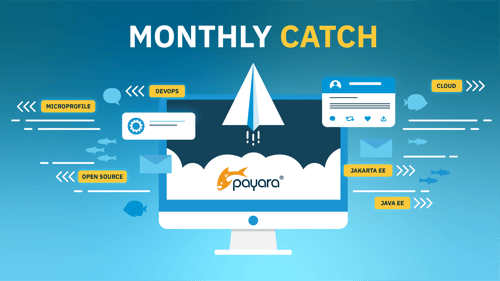What's New in the Payara Platform August Release?
Originally published on 17 Aug 2020
Last updated on 26 Aug 2020
 by Dominika Tasarz
by Dominika Tasarz
We're happy to announce that Payara Platform Community 5.2020.4 (direct download here) and Payara Platform Enterprise 5.21.1 (request here) Editions are out today!
With this patch release of Payara Platform Enterprise, we focus on stability and consolidation of the software components delivering value around your Enterprise subscription. Meanwhile, the Payara Community Edition introduces some security, stability, and monitoring improvements of features for testing, such as Remote EJB Tracing and Monitoring Console Domain RAG Status & Developer Metrics. Read more below to find out the details!
Supported Platforms in Enterprise Edition
People frequently ask us whether we support the Payara Platform on a specific JDK or OS, so we've reviewed our supported platforms for the Payara Enterprise Edition to hopefully pre-empt many of these questions by testing the Payara Platform on a variety of environments. The new updated list includes the OpenJ9 and Amazon Corretto JDKs, and Amazon ARM EC2 instances. Of course, the more common environments such as Ubuntu and Windows have also been reviewed and updated.
New Ecosystem Connectors
In-line with this release of the Payara Platform, we're also unveiling newly updated connectors for the Eclipse and VSCode IDEs with support for Payara Platform Enterprise, among other fixes and improvements. We've also released new versions of the Security, Arquillian, Maven, and Cloud connectors, all with support for Payara Enterprise Edition. More on this coming soon, so watch this space!
Payara Enterprise Docker Images
The Payara Enterprise Docker Images are now a part of the Payara Enterprise Subscription.
The Payara Platform provides the following distributions as Docker container images for both Zulu JDK-8 and Zulu JDK-11 that can be used as-is to run your applications on the Payara Platform:
- Payara Server Full
- Payara Micro
- Payara Server Node
- Payara Server Web
You can also create your own Docker images based on the provided Payara Docker container images.
Payara Enterprise Customers can access Payara Enterprise Docker Images in our Nexus repository under the repo ‘payara-docker’. Instructions for using the private Payara Enterprise Docker repo are available in the Customer Hub Support Portal.
Remote EJB Tracing in Payara Server Community
Filling a gap in the Payara Request Tracing service, this release of Payara Server Community Edition adds automatic propagation of active OpenTracing Span Contexts from Remote EJB clients (even standalone Java SE clients) when they invoke their server-side counterparts. Previously, the traces within Payara Server wouldn't have a reference to the invoking client call, and there was also a particular path where a request could complete without actually being traced (now fixed). Since this tracing has support for OpenTracing, the added benefit of allowing you to propagate additional information across the process-boundaries as Baggage Items is also present.
We will expand on this in a separate blog article coming soon.
Developer Metrics in the Monitoring Console
Payara Monitoring Console (see more in the documentation) received a major improvement in Payara Server Community Edition 5.2020.4, focusing on configuration sharing and ease of usage. This recent update will allow you to visualise metrics that are defined in applications within the Monitoring Console and make your application level metrics accessible to system administrators.
The Monitoring Console improvement, described in more detail in this blog post, includes the following features:
- Persistent page configuration, roles ('Guest', 'User' and 'Admin') & page sharing
- Bookmarkable Page URLs
- Multiple Metrics in a Widget
- Synthetic Pages and Application Metrics
Domain Red, Amber, Green (RAG) status in the Monitoring Console
-
- This release of Payara Server Community introduces new Domain RAG Status feature to the Monitoring Console, offering a better integration of the Eclipse MicroProfile health checks. Thanks to this feature, the health profile of your server can now be visualised to make scanning the status of many individual checks possible and easy. The Domain RAG Status feature informs you about server health and gives insights on which specific areas need checking or debugging.
- More on this feature coming soon in a separate blog post so watch this space!
Removed Notifiers & Connectors in Payara Platform Community
We've put the Community Edition of the Payara Platform on a small diet for this release, removing a number of notifiers. We removed notifiers from the Payara Platform Community Edition that were deemed to have questionable or no value (such as the connector for the now deceased HipChat).
It should be stressed that we didn't outright kill these notifiers - they're still present in the Enterprise Edition of the Payara Platform, and the notifiers themselves are still present in the source code (pending a move to a dedicated repository) to build for those who wish to continue using them. Barring any shifts in focus, we're also investing additional effort into making the notification service itself more extensible in future releases should a developer wish to write their own notifier.
Release Notes
The Enterprise Release (request here) includes 1 new feature, 1 improvement & 5 bug fixes; while the Community Release (direct download here) includes 2 new features, 5 bug fixes, 10 improvements and 1 component upgrade.
See more detailed overview of the fixes and improvements in the Release Notes:
Download The Latest Payara Platform Release
Don't forget to update your Payara Platform to the new version! You can Download the Payara Community Edition here, or request the Payara Enterprise Edition via this form.
As usual - if you have any questions, feedback or suggestions, please post them in the comments below or email us at community@payara.fish
Related Posts
What's New In The Payara Platform September 2025 Release?
Published on 03 Sep 2025
by Luqman Saeed
0 Comments
The Payara Monthly Catch - August 2025
Published on 02 Sep 2025
by Dominika Tasarz
0 Comments


